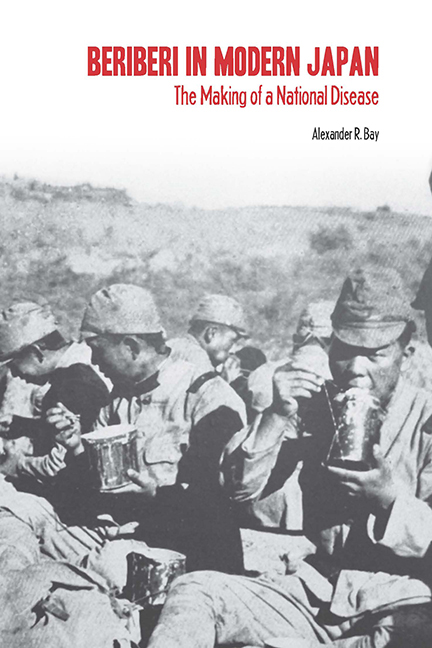Book contents
- Frontmatter
- Dedication
- Contents
- List of Illustrations
- Acknowledgments
- Introduction: Medicine, Power, and the Rhetoric of Empire
- 1 The Geography of Affliction: Beriberi in Edo and Tokyo
- 2 Putting the Laboratory at the Center
- 3 Beriberi: Disease of Imperial Culture
- 4 Empire and the Making of a National Disease
- 5 The Science of Vitamins and the Construction of Ignorance
- 6 The Rice Germ Debate: Total Mobilization and the Science of Vitamins in the 1930s
- Conclusion
- Notes
- Bibliography
- Index
Introduction: Medicine, Power, and the Rhetoric of Empire
Published online by Cambridge University Press: 08 April 2017
- Frontmatter
- Dedication
- Contents
- List of Illustrations
- Acknowledgments
- Introduction: Medicine, Power, and the Rhetoric of Empire
- 1 The Geography of Affliction: Beriberi in Edo and Tokyo
- 2 Putting the Laboratory at the Center
- 3 Beriberi: Disease of Imperial Culture
- 4 Empire and the Making of a National Disease
- 5 The Science of Vitamins and the Construction of Ignorance
- 6 The Rice Germ Debate: Total Mobilization and the Science of Vitamins in the 1930s
- Conclusion
- Notes
- Bibliography
- Index
Summary
During the Russo-Japanese War (1904–5), Superior Private Satō Ikutarō, a farmer who hailed from Miyazaki Prefecture, developed beriberi. He was experiencing swelling in his legs and an accelerated heartbeat. After receiving an examination on January 31, 1905, he was ordered to report to the Sixth Division's Fourth Field Hospital on February 8. By the time Satō entered the hospital, his condition had deteriorated. His face was swollen and pale, and he complained of total body fatigue. His pulse was 120 with a weak heartbeat. Enlarged and dry, Satō's tongue was covered in a yellowish brown slime. His stomach was bloated and hypersensitive. Nausea was continuous and he vomited occasionally. On the tenth of February, Satō's heart rate and breathing accelerated. The nausea continued. Though very thirsty, he struggled to drink. Lying fl at on his face, he moaned yet could not rest. On the twelth, due to nausea, he could not take medicine or food. Treatment had no effect, and Satō died at 7:55 p.m. that evening. Army doctors entered “paralysis of the heart” in his death record.
A diet deficient in thiamin—vitamin B1—causes beriberi. Thiamin is an important vitamin that burns carbohydrates, or glucose, producing carbon dioxide and water, which provide cells with their source of energy. In short, vitamin B1 allows the body to turn glucose into energy, and without this nutrient, the body loses the ability to fuel muscular activity. Beriberi can lead to heart failure, as happened to Private Satō Ikutarō. The clinical symptoms of beriberi include edematic, neurological, and cardiovascular maladies. The classic signs are “a heaviness in the lower limbs, loss of strength in the knee joint and wrist, and usually some loss of sensation … tightness in the chest, palpitations, restlessness, loss of appetite, and often a full feeling in the epigastrium.”
Based on the work of Christiaan Eijkman (1858–1930) and others, American, European, and Japanese scientists sought in the 1910s to isolate a compound found in rice bran that protected against and cured beriberi. By 1927, vitamins B1 and B2 complex had been identified, but it was not until 1933 that Robert Williams (1886–1965) extracted crystalline vitamin from large quantities of rice bran. Williams and chemists from the pharmaceutical maker Merck and Company then synthesized thiamin in 1936.
- Type
- Chapter
- Information
- Beriberi in Modern JapanThe Making of a National Disease, pp. 1 - 10Publisher: Boydell & BrewerPrint publication year: 2012



